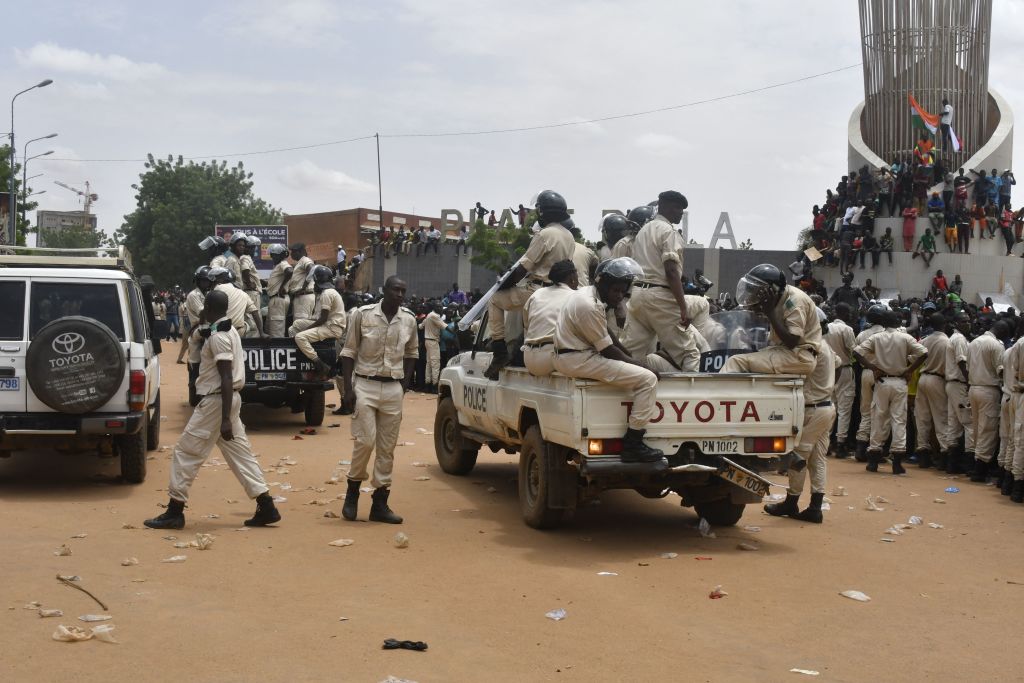ADF STAFF
As recent military coups have swept aside civilian governments from Guinea to Sudan, one question lingers: When will those countries return to civilian or democratic rule?
The answer, experts say, depends on how determined the military is to remain in power, particularly if it tries to rig elections to give leaders a veneer of democratic legitimacy.
In some cases, junta leaders promise to hold elections and restore democracy within a defined period of time — three years in the case of Guinea and, more recently, Niger. However, a coup permanently damages a country’s political and social institutions.
“In instances where juntas withdraw from power, democracies don’t emerge,” researcher Sebastian Elischer, an expert on West African coups, wrote recently for The Conversation.
Elischer noted that his research showed that juntas restored civilian governments in about half of the 32 coups studied worldwide between 1989 and 2017.
“However, even with the military’s withdrawal from power, the transition period to civilian rule was highly volatile,” Elischer wrote. “Particularly in sub-Saharan Africa, counter-coup attempts by a rival faction within the armed forces intending to remain in power occurred rather frequently.”
Junta leaders who see greater risks in returning power to civilian leaders than in keeping it for themselves are unlikely to return to the barracks, Elischer said.
“In Burkina Faso and Mali, juntas and the military at large feel that the territorial integrity of their nations is at stake,” Elischer told ADF by email. “But they also feel that previous civilian rulers have mistreated the military.”
A similar situation exists in Niger, where, according to Elischer, coup leader Gen. Abdourahmane Tchiani deposed elected President Mohamed Bazoum, who was about demote him. In Sudan, two generals deposed the incoming civilian government that threatened the military’s vast network of business enterprises. The generals since have turned on each other in a fight for military supremacy in Sudan.
Despite preconflict measures to create a civilian government in Sudan, Elischer remains skeptical that military leaders actually will cede power if it means losing privileges they now enjoy.
“The conditions in which the Armed Forces in Sudan are operating will compel the Armed Forces to entrench themselves in power,” Elischer told ADF.
Two factors determine the fate of a coup, according to Elischer: the unity of the military and the strength of civil society groups organized to protest the coup.
“If a coup occurs in response to threats to the country’s territorial integrity, to the preservation of public order, or to the military’s material or reputational benefits, the junta will have the backing of the military at large,” Elischer wrote. “This is because the benefits of seeking power outweigh the risks of not being in power.”
Coup leaders in Burkina Faso and Mali claimed that their actions were needed because civilian leaders had failed to rid the countries of extremist violence. In both cases, juntas turned to Russia’s Wagner Group mercenaries to accomplish that task. There is, however, no proof that Wagner ever has succeeded in doing that.
More often than not, juntas that invite Wagner into their countries find that extremist violence worsens as Wagner’s brutal tactics generate more resistance among communities subject to executions and other human rights violations, experts say.
“The evidence from other African countries, in particular Mozambique, shows that Wagner is incapable of resolving local security issues,” Elischer told ADF.
Domestic opposition to a coup can drive the return to civilian rule, according to Elischer.
Recent coups have prompted international donors to suspend financial aid to pressure juntas to reinstate civilian rule. Regarding Niger, the Economic Community of West African States has threatened military action to restore Bazoum. However, according to Elischer, international pressure rarely causes juntas to change course.
Even if coup leaders agree to surrender power, the damage they have done to human rights and the political process in their countries is significant, he added.
“Generally, military coups bode ill for the democratic process,” Elischer wrote in The Conversation. “When juntas rig post-coup elections, they become entrenched in power in the medium and long term.”

